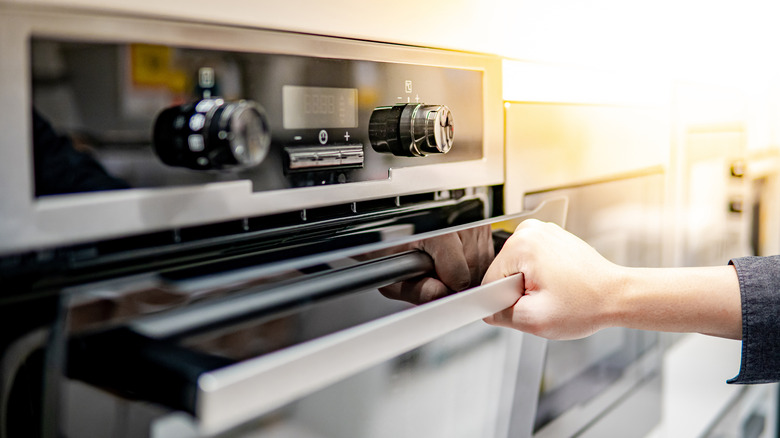The Easy Trick That Will Stabilize Your Oven Temperature
Where would we be without our ovens? Whether baking up cookies or cakes or savory dishes ranging from casseroles to roasts to breads, the oven is one piece of equipment that truly gets the job done — and we've all likely experienced the frustration that accompanies cooking when it goes on the fritz.
Dealing with an out-of-commission oven is one thing, but even day to day, ovens don't always work exactly the way we want them to. For example, did you know that oven temperatures vary wildly and that the temperature dial on your oven is likely inaccurate? According to General Electric, oven temperatures can vary from what you've set yours to by up to 30 degrees in either direction, temperature fluctuations that are further influenced by opening the oven door, the ambient temperature in the kitchen, and other factors. And as explained by Reviewed, even when you set your oven to a certain temperature, it's more of an estimated goal than an exact level the appliance will reach. This explains why some foods we bake seem to take an eternity — or, at the other end of the spectrum, come out burned in what seems like the blink of an eye.
So basically, ovens don't reach or maintain the stable temperatures we expect them to. But there's a simple trick you can employ at home to keep your oven temperature more regular, helping to more reliably heat and cook your favorite foods.
Keep a pizza stone in your oven to stabilize its temperature
If you've ever made a pizza in your home oven, you may have employed a pizza stone, typically a flat piece of unglazed clay that readily absorbs and retains heat and which can help a pizza crust get nice and crispy (via Food Network). But did you know that in addition to helping create delicious pizzas, pizza stones can actually help stabilize your oven's temperature?
As explained by the blog One Good Thing, keeping a pizza stone on the bottom rack of your oven is a handy way to help keep the appliance's temperature more regular — and thus help it cook your food more evenly and predictably. Although the oven will take a bit longer to heat up, once it reaches temperature, that temperature will remain more stable, since the stone acts as a buffer between the oven's heat source and your food. Since it holds on to heat so well, the pizza stone will also help regulate the loss of heat that happens when you open the oven door to check on the food. Want to employ this trick at home? It's a low risk investment: Decent pizza stones can go for under $20 and over $100.

